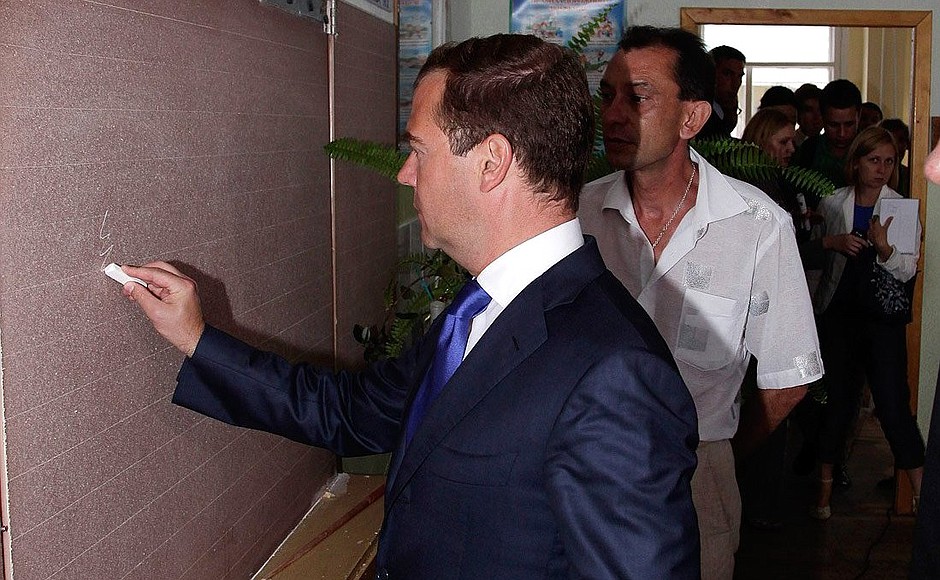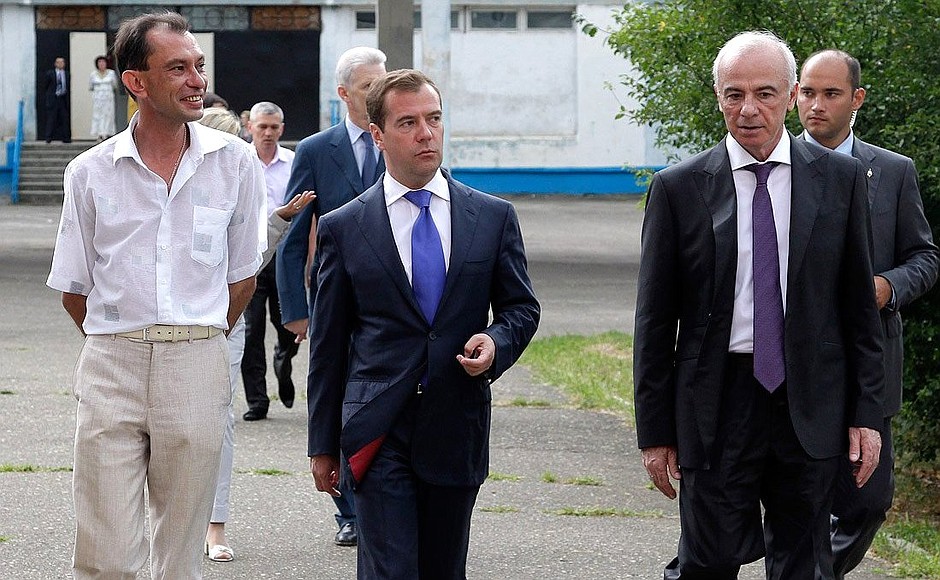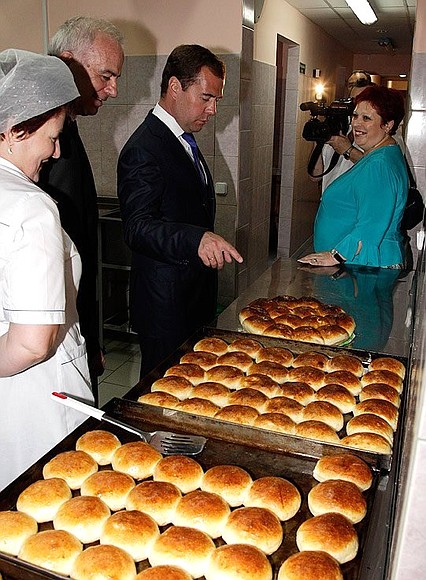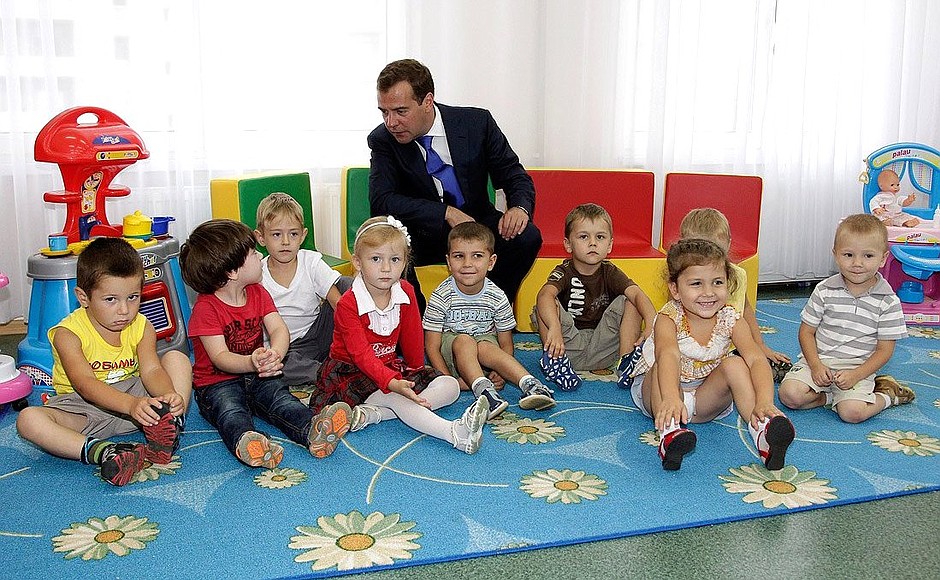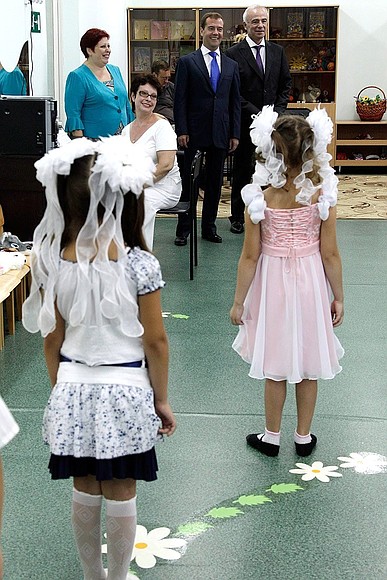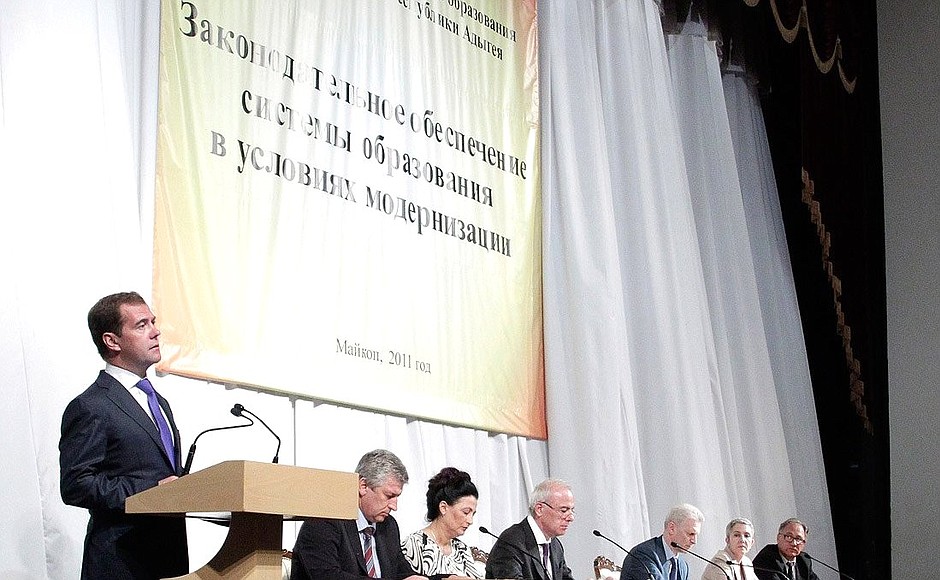Schools traditionally hold staff meetings in mid-August. This year, they are focused on draft federal law On Education in the Russian Federation. In his address at the meeting, Dmitry Medvedev summed up the preliminary results of the public debate on the draft law.
Before the meeting, Dmitry Medvedev inspected a general education school undergoing reconstruction and visited a kindergarten which had been built using the latest technology.
* * *
Opening remarks at meeting on legislative support for education
President of Russia Dmitry Medvedev: Good afternoon, friends. I am very happy to be here today.
Before this meeting, before coming here to speak with you, I drove around Maykop a little. It is a green and beautiful city but that does not mean that there is nothing left to do: there are always things that can be improved. I visited two educational institutions: a school and a kindergarten. Right now almost all of you present here are busy getting schools ready for the next academic year. This is a big challenge considering that some of the schools in the city are getting old and are facing various problems, but at the same time it is vitally important that progress is made on minor matters step by step and eventually solutions to major challenges will present themselves as well. From what I saw today, I can conclude that they are being tackled but I am not sure how far, and I would very much like you to tell me about it.
Now a few words on current issues. The new school year will begin in just a short time, in two weeks, and your staff meeting, just like many other staff meetings held at this time of the year at schools across the country, is focused on matters that concern a large number of people in Russia. Let me remind you that Russian schools have more than 13 million students and nearly a million teachers. I'm not even talking about tens of millions of parents, who are also preparing for the start of the academic year. We should seek to address many of the outstanding issues in education through legislation. The future law on education must reflect this at least in general terms. This law is very complicated and involves a whole set of relations, ranging from institutional to socioeconomic. Such laws are usually passed for many years ahead, and this law is closely connected with Russia’s long-term development strategy.
In other words, this law essentially aims to outline our future, the state of our economy, society, culture, science and technology. And that is why some time ago I made the decision to launch the widest possible public debate on this draft law.
Let me remind you that the first version of the draft law was published on the Education and Science Ministry website in May 2010. After that, it underwent major revisions. The second version was published on a special website created as a platform for public discussion. All in all, the site’s 12,000,000 visitors posted nearly 11,000 comments. The main conclusions were presented to me and I hope that they will be reflected in the final version of the draft law.
”The law has been discussed by everybody, but the debate is still going on. Over 40 regions have submitted their proposals. I would like the Government to submit a detailed report to me on this work.“
The law has been discussed by everybody, including those present here; nevertheless, the debate is still going on. Over 40 regions have submitted their proposals. I would like the Education and Science Ministry to hold a general meeting for all the regions once again and announce the results because as far as this law is concerned it is vital that we look before we leap, and by that leap I mean adopting the law. Therefore, I would like the Government to submit a detailed report to me on all of this work. At the same time, we all realise that even such major laws as this one, laws that are momentous for the education system, are never adopted once and for all, as if given to us from above, but that we can always change them. As you know, practice will be the best indicator of how successful our efforts have been.
I intend to hold many meetings devoted to this issue. The Commission for the Implementation of Priority National Projects and Demographic Policy will hold a meeting in the near future, and one of its tasks will be to examine the progress made by the Our New School initiative. We will hold other meetings as well. I think we must agree on all the main points of the law: those that affect the quality of education, guarantees of people’s rights regarding all types of education, including pre-school, general and higher education. There are a lot of complications but I don’t want to jump the gun, you will probably have a lot to say about the things you believe are right or wrong, including some major revisions like those concerning the accessibility of intermediate vocational education.
I would also be very interested in hearing your views about the future of rural and small schools, a topic that is very sensitive for Adygea as well as the whole country.
”The teachers' wage fund must increase at least by one third in the next academic year. This growth will be ensured through federal subsidies to the regions intended for the modernisation of education. But this will very much depend on the commitment of each region.“
The initial position here is clear. My thinking is based on the assumption that rural areas can survive only if they have schools. As soon as a school is closed, the village very often falls apart. At the same time we cannot accept the shortage of qualified teachers in small communities. Perhaps in such cases it may be better to merge several schools in the area and provide transport to take the children to school. This matter has no single universal solution and must be addressed on an individual basis in every area. Each locality needs an individual approach. I would be very glad if you could share your thoughts about this too.
Regarding the modernisation of basic vocational education, we can also talk about the continuity of educational programmes starting from kindergartens and schools. Finally, the public debate raised another acute issue: the real opportunities of choosing a school, especially considering that there are already problems with enrolling children in local schools. This subject is also highly relevant.
Another set of issues has caused a major response in the education community, as well as in other spheres. It concerns ordinary people, parents, because they care about teachers’ wellbeing. I am referring to the social status of teachers, their financial situation and their workload. This is where we have received the greatest number of proposals from teachers. I would like to stress here that the new draft law should not set any salary ceilings: the salary must be determined based on the teacher’s qualifications, the complexity and the quality of the work. It is vital that teachers’ salaries are no lower than the remuneration of those employed in the economy of the same region. That is the only correct approach. To achieve that, we must plan expenditure carefully, but the objective is absolutely right.
The teachers' wage fund must increase at least by one third in the next academic year. This growth will be ensured through federal subsidies to the regions intended for the modernisation of education. But this will very much depend on the commitment of each region. The procedure for subsidy applications has been approved and the money will be transferred to the regions.
”Preschool education should follow federal standards, which will be gradually introduced at primary schools starting from this academic year.“
Another frequently debated subject is the reorganisation of municipal general schools into the so-called autonomous institutions. I remember we addressed this for the first time as part of the Education Priority National Project, when I was still working in the Government. This status gives many advantages, primarily in terms of raising teachers’ salaries and their motivation to be more creative in their work. These new autonomous institutions use financial and economic mechanisms, as well as new forms of dialogue with civil society, which is equally important.
The situation in the regions varies. One example: in the Novgorod Region the number of such municipal schools that have been reorganised into autonomous institutions exceeds 85%. That is a great deal. The teachers’ average salary there is over 17,000 rubles. But many regions, including Adygea, have not moved this process forward. I would like to understand the reasons for that and your possible doubts. Perhaps we can dispel some of them.
The debates also focused on pre-school education to a large extent. The draft law strengthens the guarantee of pre-school education through the transfer of financial obligations from municipalities to the regions of the Russian Federation. The draft law guarantees pre-school education for every child, whether it is received at home or at a kindergarten, including private kindergartens. Furthermore, preschool education should follow federal standards, which will be gradually introduced at primary schools starting from this academic year.
”I ask the Ministry [of Education and Science] and the Government to prepare legislative and technological solutions that will prevent violations of EGE rules.“
I would also like to hear about your problems with the organisation of creative activities for children, problems related to physical culture and sports, which are probably connected mainly with the shortage of funds because no one refuses such benefits of their own free will. Where there is money, schools build stadiums, playgrounds, swimming pools. But there are also methodology problems, and the draft law devotes considerable attention to them.
There’s another matter that concerns all people: parents, political parties, and in general, there is no one who is indifferent to it (only the lazy have not spoken out about it) — the National Final School Exam [EGE]. In principle, the controversy over whether or not it is needed has become a thing of the past. I can tell you from personal experience, and I often talk with teachers in different places, different schools and different regions. I have never heard a teacher say that it is a harmful thing and we should not have introduced it. None of the teachers I have spoken with have ever said this. Politicians have, but politicians have their own agenda, they need to score political points, but I have never heard teachers say this.
”I will issue instructions to organise a public debate on the further evolution of the EGE.“
But there are some serious problems. I believe it is only right that we try to improve it every year. This year we have come across another set of unpleasant facts, and they are all well known to you: exam assignments were posted on social networking sites, and university students completed the tests for some school students. But I will tell you frankly, I do not think this is a defect of the EGE: it is just a gross violation of the rules and, I am sorry to say, a lack of culture. Everyone must realise this. Both teachers and parents must be aware that such violations go against the students’ interests. After all, everyone understands why we need knowledge. It is not to get the right degree certificate and keep it on a shelf somewhere. In order to prevent this from happening again, I ask the Ministry [of Education and Science] and the Government to prepare legislative and technological solutions that will prevent such violations. Mr Fursenko [Education and Science Minister], are you working on that? Good.
In addition, I will issue instructions to organise a public debate on the further evolution of the EGE. But this does not mean we are going to reverse our policy. I believe that ultimately this policy and the decisions that led to it were absolutely correct. I know about this matter firsthand.
Next year we will celebrate one of the anniversaries of Russia’s statehood. I have issued instructions to hold the 2012 Olympics in Russian history and the history of Russian regions. Moreover, we need a modern system of promoting historical knowledge, one that is tailored to our students of all ages. Here, a great deal depends on the teachers themselves. I hope that the new educational standards will offer opportunities to incorporate information about different regions, ethnic groups and faiths in the curriculum.
”The new educational standards will offer opportunities to incorporate information about different regions, ethnic groups and faiths in the curriculum. It is important that we teach our young people to respect not only their own culture, but also to be tolerant.“
It is important that we can teach our young people to respect not only their own culture, which is certainly necessary, but also the culture of their neighbours, and to be tolerant. This is crucial, and we can see it from our experience of the dramatic events that occurred in a certain period, and also from many events that have taken place in other countries, and that should be a lesson for all of us. It is particularly important to introduce children living in multinational regions to different cultures so that they do not perceive them as alien or annoying but as something friendly, normal and understandable. A vital part of this effort is to provide high-quality teaching of history, the Russian language as the official language of the Russian Federation and the students’ own native languages. We all know perfectly well that the ability to live in mutual harmony can only be instilled in childhood. Those who are brought up in hate, as a rule, keep their mindset for the rest of their lives.
Colleagues,
The teaching profession, the teachers’ work – we often say things that sound trite but in fact they are absolutely true – is not just a job or a career; it is a vocation and it will always remain that. If you like, teaching the young generation is a strategic mission for every nation. Therefore, a modern, skilled, well-trained teacher is one of the central figures of Russia’s development and modernisation, which is our priority. And I very much look forward to your contributions to this process.
Now let us talk about current issues.
<…>
